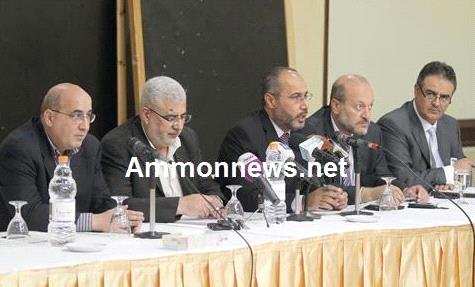Ammon News - by Hani Hazaimeh | The Jordan Times
AMMAN — Members of the National Initiative for Building, otherwise known as the Zamzam Document, on Thursday said their project seeks to assist Jordan to arrive at a national consensus on its path to democratic reform.
The initiative was launched last year by moderate Islamists from the Muslim Brotherhood and other political figures, who made proposals to address the challenges facing the Kingdom.
The Brotherhood rejected the move, which was seen as a sign of crack within its ranks.
According to Zamzam leaders, only 15 per cent of the 600 figures involved are Brotherhood members.
At a press conference, members of the initiative stressed that Zamzam was created in response to the security threats facing the Kingdom, both internally and externally.
According to general coordinator and founding member Rheil Gharaibeh, a Muslim Brotherhood leader, Jordan’s “shallow political partisan life”, threats facing young Jordanians and the increasing violence across the nation’s universities were the major stimuli behind Zamzam’s formation.
“The misunderstanding of moderate Islam at the expense of extremism has been growing and has spread worryingly throughout society. Also, corruption was rife in the government and powerful groups were influencing the decision making heavily. These factors, among others, called for a national movement such as Zamzam to emerge,” Gharaibeh said, adding that Islam should be a unifying element in society as it calls for coexistence and tolerance.
“This initiative is open to all Jordanians who seek the interest of the country and willing to work together to achieve its objectives,” he said.
Noting that Zamzam’s members do not seek personal gains or political or public posts, Gharaibeh stressed that they will work with the government so as to better serve Jordanian citizens.
“We distinguish between the political system and the state. We are citizens and we are part of the state who are keen to protect the country’s stability, enforce the rule of the law and prevent violence and chaos. We are willing to work with the public and private institutions to combat corruption,” he said.
Gharaibeh stressed that although the Palestinian issue will always be the biggest threat to regional stability, ruling powers in the Middle East should not use the conflict as a tool for oppression and practising all forms of tyranny against the people.
As for the Syrian crisis, Gharaibeh condemned foreign involvement in inciting violence in neighbouring Syria, stressing that those supporting either side of the conflict are only protecting their own interests and not concerned with alleviating the suffering of the Syrian people.
In that regard, he criticised Egyptian President Mohamed Morsi’s decision to shut down its embassy in Damascus, adding that his decision does not help in finding a peaceful end to the Syrian crisis.
Meanwhile, Nabil Kofahi, a coordination committee member, said the initiative is not only focused on politics, despite its centrality in the reform process, but has greater societal aims.
The initiative aims to restore the missing confidence in the government on all societal levels, raise the public’s awareness on their duties as responsible citizens and educate them on how to participate meaningfully in the Kingdom’s political system, according to Kofahi.
